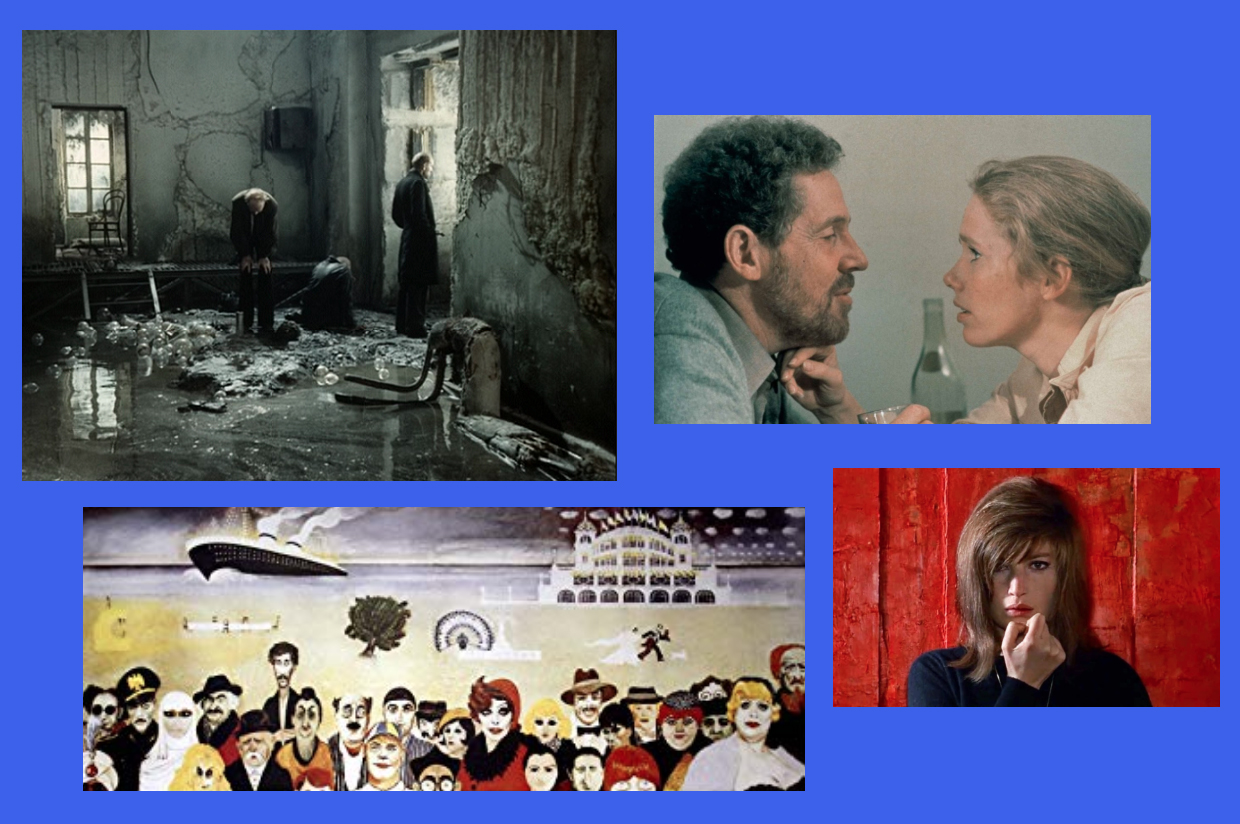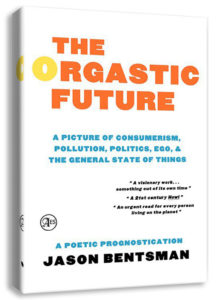
A list of my ‘favorite’ films, now and past, in no particular order (other than the tiers)
first tier
Woman in the Dunes – Hiroshi Teshigahara
Stalker, Solaris, Andrei Rublev, The Sacrifice – Andrei Tarkovsky
The Seventh Seal, Wild Strawberries, Face to Face, Scenes From A Marriage – Ingmar Bergman
La Dolce Vita, 8 ½, Satyricon – Federico Fellini
Pather Panchali (Song of the Little Road) – Satyajit Ray
Fitzcarraldo, The Enigma of Kaspar Hauser – Werner Herzog
Red Desert – Michelangelo Antonioni
the best of Woody Allen’s oeuvre collectively (especially Take the Money and Run, Annie Hall, Crimes and Misdemeanors, and Deconstructing Harry)
Terrence Malick’s oeuvre collectively from Badlands to The New World
The Passion of Joan of Arc, Vampyr – Carl Dreyer
The Trial – Orson Welles
That Obscure Object of Desire – Luis Bunuel
The Grand Illusion – Jean Renoir
The Blue Angel – Josef von Sternberg
Faces – John Cassavetes
Ikiru – Akira Kurosawa
Brother Sun, Sister Moon – Franco Zefirelli
A Zed and Two Noughts – Peter Greenaway
Last Tango in Paris – Bernardo Bertolucci
The Holy Mountain – Alejandro Jodorowsky
Three Women – Robert Altman
second tier
Casablanca – Michael Curtiz
Gattaca – Andrew Niccol
Midnight Cowboy – John Schlesigner
The Graduate – Mike Nichols
Defending Your Life – Albert Brooks
Groundhog Day – Harold Ramis
The Wall – Alan Parker
Interview with the Vampire – Neil Jordan
Lolita – Adrian Lyne
The Abyss – James Cameron
Phantom of the Paradise – Brian De Palma
Enter The Void – Gaspar Noé
Idiocracy – Mike Judge
Freddy Got Fingered – Tom Green
The Room – Tommy Wiseau
third tier
These are films that made a big impression, equally meritable as the above,
and which I feel like I ought to mention, but for whatever idiosyncratic reasons
did not quite become personal favorites, more like ‘runners up.’
Celine and Julie Go Boating – Jacques Rivette
The Color of Pomegranates – Sergei Parajanov
Bad Boy Bubby – Rolf De Heer
Sátántangó – Bela Tarr
Playtime – Jacques Tati
Ashes and Diamonds – Andrzej Wajda
Umberto D, Sunflower – Vittoria De Sica
A Dangerous Method – David Cronenberg
Blue – Krzysztof Kieslowski
From the vault. . . EXIT MUSIC
‘A short ambient film about being a humanist in the postmodern world.’
Note: The film is uploaded at a resolution optimized for viewing on laptop and PC; watching at larger sizes will cause increased graininess (that is, even grainier than it’s supposed to be). For optimal effect, the volume should be turned up loud.
A Little About the Film
Short description
‘A short ambient film about being a humanist in the postmodern world…’
Given the current climate in the US—and the world—and Autumn now in the air (while Autumn still exists), thought it would be fitting to share this short film I made some years ago, which deals with the alienation and pollution of Consumerism and media, and has a certain gothic / Halloweenish aesthetic.
Reductively speaking, the film illustrates the subjective perspective of a young man alienated from his postmodern, consumeristic, media-addled, and polluting society, as he drives over a 24 hour period through a faltering landscape…
Inspired in part by a comment by Russian filmmaker Andrei Tarkovsky about the future of cinema: “It would be nice, let us say, to shoot a film in complete freedom… Reject large financing. Have the possibility to observe nature and people, and film them, without haste. The story would be born autonomously…”
EXIT MUSIC was made as an equal partnership between happenstance and direction. A basic plot and direction was conceived, and the filmmakers then set out on a two day road-trip to see what they would come across, with a certain amusement park as their sole planned destination. The film is comprised entirely of found, unplanned imagery, and partially of found sounds, themselves altering and shaping the original conception, molded in the editing process into a certain plot, with certain poetic symbols and resonances.
Reductively speaking, the film illustrates the subjective, skewed, blurred perspective of a young man alienated from his postmodern, consumeristic, media-addled, and polluting society, as well as seemingly from himself and his own emotions, as he drives over a twenty-four hour period (maybe shown chronologically, maybe not) through a faltering landscape, in a seemingly increasingly despairing state of mind. Maybe aimlessly, or maybe intentionally going to certain destinations and his impending doom. Thus the film operates mainly on subjective and subconscious levels, seamlessly blending the character’s memories, fantasies, and sensations with his impressions of the exterior world.
The sometimes jarring editing, preventing tranquil contemplation, allowing few moments of respite; the fogginess and besmirchedness, many of the impressions blurry behind stained glass and multiple surfaces; and the selective sound design, made up of contemporary digital and technological music, sounds, noises, and feedback, in parts discordant, strident, and unremitting, allow the viewer to share in the character’s myopic experiences, contributing to the impression of decadence, decline, and ruination.
However, the limited third person perspective, which sometimes steps back to reveal a more objective assessment; the ongoing defamiliarizaton of that which is typically taken for granted; the bright, impressionistic colors, landscape, and attractive abstracted patterns; and the insouciance of being in transit, on the road, in motion, observing nature and all passing phenomena, complemented at times by not unpleasant or even galvanizing music, indicate that there is a kind of transcendent beauty, a kind of “music” in this societal and environmental decline, and even in the dissipation and perhaps impending death of the character himself. However subjectively bleak things seem, a rarefied “music” in existence. That if the character could get out of his own preoccupations and interpretations and simply tune into life itself, there could be a kind of relief or peace that would offer some salvation. Perhaps this is what the song during the credits and momentary clip at the end allude to?
The film was inspired in part by a comment by Russian filmmaker Andrei Tarkovsky about the future of cinema: “It would be nice, let us say, to shoot a film in complete freedom, like amateurs make their films. Reject large financing. Have the possibility to observe nature and people, and film them, without haste. The story would be born autonomously: as the result of these observations, not from obliged shots, planned in the tiniest detail. Such a film would be difficult to realize in the manner that commercial films are realized. It would have to be shot in absolute freedom, independent from lighting, from actors, from the time employed in filming, etc, etc. And with a reduced gauge camera. I believe that such a method of filming could push me to move much further forward.” In part by the Dogme film movement, utilizing some of its technical formulations and constraints. And in part by the perennial movements of structured spontaneity in the arts, reflected, for example, in the paintings of the Post-Impressionists and Expressionists, in 20th century Jazz Music, in the photographs of Henri Cartier-Bresson and others of the “street photography” movement, and in the writings of the Beats. There are also Surrealist and Gothic influences, among others.
Director: Jason Bentsman. Starring: Milton Shadwell.
∆ Ithaca Film Festival “Best of Fest” & Touring Program





Recent Comments